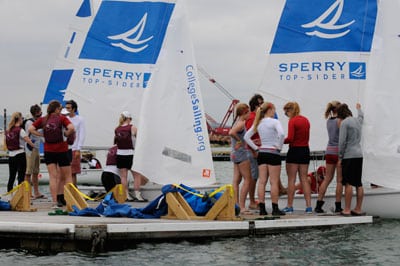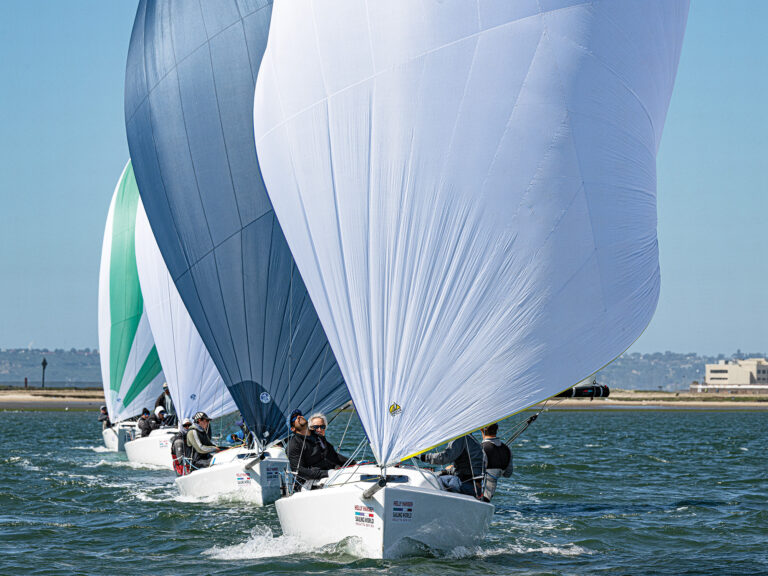
College Sailing from the dock
While some colleges send heavy crews to nearly every intersectional, other teams, such as my own, follow a more minimalist route. With the prerogative to get everyone sailing each weekend, even a huge team can get spread thin enough that there are no extra bodies on the dock, even at intersectionals. As a medium-sized crew, this approach suits me just fine; my skipper and I weigh just over 270 lbs. together and have built enough muscle in the gym and in V-15s that hiking for 10 races straight is not a problem.
At qualifying events, though, it’s time to throw the minimalist approach out the window and make sure that your team is prepared for every kind of breeze. Keep an eye on the forecast all week, and make sure that the best and strongest heavy crews know that they might be in for a van ride. Double-check logistics like food money, housing, and available seatbelts so that you’re not unprepared when Friday rolls around.
On an individual level, this also involves a reminder that there is no “I” in “team,” and that success is not measured by how many races you sail but how your team does overall. Helping your team win races—when you’re on the dock—is a multi-faceted matter.
The first facet is your skipper. She or he is likely already going to feel some anxiety about sailing with someone with whom they have significantly less time in the boat, and you’ve got to do everything you can to assuage these feelings. In the week leading up to a big regatta, make sure that your heavy-air crew sails with your skipper for at least part of one practice, or more if the forecast is for serious breeze.
At the competition itself, you may have a coach there to make the call about who’s going in, and you need to accept that call without question. The decision gets a little bit harder when you don’t have someone out of the boat there to lay down the law, and you need to let your skipper know that you’re supportive of whatever decision they choose to make. Luckily, in the majority of college sailing you’re able to make personnel switches pretty easily, so if the breeze does lighten up, it’s not going to be the end of the world; don’t hesitate to remind your skipper of this.
Without being overbearing, try to make the transition as painless as possible when the call comes for you to be taken out. Help set up the boat, even if you’re not going to be in it; this means checking over all the things that you would if you were going sailing, such as telltales, hiking straps, and rig tension. Make sure that the heavy-air crew is adequately equipped with bailers and water, and quickly share any important knowledge that you’ve picked up so far about the fleet and conditions.
After pushing the boat off the dock with words of encouragement, you’ve become part of the dock crew. Your responsibilities are not only to your own skipper, but also to the boat, or boats, in the other division(s). Especially at an event with multiple fleets on the water at once, this includes having snacks and water at the ready and making rotations as seamless as possible. Again, help make sure that each new boat is set up correctly to avoid breakdowns and maximize speed, and share any insight that you might have gained from watching the racing. Find out what your teammates need to be comfortable, warm, and prepared for the conditions on the racecourse, whether it’s a spray top you’re not using or an extra roll of electrical tape, and make sure that you get it to them in time.
Last but not least, make sure that you’ve got the right mindset. At some point, much of what being a crew boils down to is weight on the rail. Sure, you might be great at calling the shifts and ooching on waves, but chances are that your heavy-air crew is, too, and their extra inches and pounds are going to make that boat go faster than anything you’re capable of in heavy air.
Be positive and supportive, and always, always, be mentally and physically prepared to go back in. That means pinny and sunglasses on, bailers in hand, and everything you’ve observed from land in the back of your head. Be ready every time they approach the dock, but don’t push to go back in or sulk if you’re once again relegated to dock crew. If your skipper is focusing on you and worrying about your feelings or lack of preparedness, then that attention is detracted from their next race, and that’s not fast.









